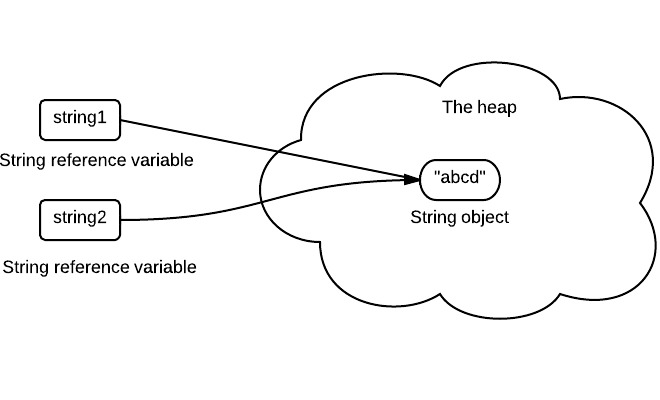Discovering the Advantages of Immutable Strings in Modern Programs Paradigms
In the world of modern-day shows paradigms, the idea of unalterable strings stands as a foundation of robust software application advancement. The advantages they offer go beyond mere ease; they basically modify the method data is managed within applications. By adopting unalterable strings, designers can guarantee improved information honesty, enhanced thread safety, streamlined debugging procedures, boosted safety and security measures, and effective efficiency optimization. These benefits function as a testimony to the extensive impact that welcoming immutability can carry the reliability and efficiency of software application systems.
Boosted Information Integrity

By preventing the alteration of string items, immutability eliminates the danger of unintentional changes to the data they hold. This not just boosts the safety and security of the information however additionally enhances the reliability of the code that depends on these strings.
Immutability additionally supports safer multithreading settings, as concurrent access to unalterable strings does not present the danger of data corruption via synchronised adjustments. This home simplifies the process of managing strings in parallel shows scenarios.
Essentially, immutability works as a protective shield around the data stored within strings, boosting their stability by making sure that once defined, their values stay unmodified throughout the program's implementation.

Improved Thread Security
Immutable strings improve the string safety of programs by guaranteeing that when a string object is produced, its worth can not be modified. This home removes the risk of simultaneous threads trying to change the exact same string simultaneously, which could lead to data corruption or irregular states in the program - Why are strings immutable in Java?. In a multi-threaded atmosphere, where several strings accessibility and manipulate data simultaneously, the immutability of strings provides a level of security by ensuring that the information stays the same throughout its lifecycle
Streamlined Debugging Processes
Provided the boosted string safety and security assisted in by unalterable strings, a substantial benefit occurs in the realm of simplified debugging procedures. Unalterable strings, as soon as created, can not be changed, making it simpler to trace the flow of information and recognize the resource of pests in a program. This immutability ensures that strings stay consistent throughout the execution of the program, reducing the likelihood of unforeseen adjustments that might bring about errors.
When debugging with mutable strings, developers commonly run into problems where a string's worth is customized inadvertently, making it testing to determine the root reason of a pest. However, with unalterable strings, the information remains unmodified, permitting developers to concentrate on analyzing the real logic of the code rather than locating where and when a string was customized inaccurately.
In addition, unalterable strings simplify the debugging procedure by enabling less complicated recreation of pests. Because immutable strings do not alter state, designers can recreate and study pests better, resulting in quicker recognition and resolution of concerns my website within the codebase. This structured debugging process eventually adds to greater software program high quality and improved overall growth performance.

Enhanced Safety Actions
Enhancing information protection and fortifying system integrity, the utilization of immutable strings in software applications contributes considerably to boosted safety procedures. Unalterable strings, as soon as created, can not be changed, supplying an important defense against destructive tampering or unapproved gain access to. By guaranteeing that sensitive data saved in strings remains unchanged throughout the program's execution, the threat of data breaches or shot assaults is substantially decreased. Why are strings immutable in Java?. Unalterable strings additionally play a vital duty in stopping typical security vulnerabilities such as buffer overflows and SQL injection assaults, as attempts to control string information at runtime are inherently restricted.
In addition, the immutability of strings improves the predictability of program behavior, making it less complicated to confirm inputs and avoid unforeseen modifications that can endanger security. This predictability simplifies the process of auditing and confirming code, enabling programmers to recognize potential security loopholes better. Overall, incorporating immutable strings right into software application development practices not only enhances the effectiveness and reliability of applications however additionally reinforces their strength versus safety dangers.
Efficient Performance Optimization
Structure upon the structure of enhanced safety actions accomplished through the utilization of unalterable strings, an essential element to take into consideration in software application advancement is effective performance optimization. When taking care of mutable strings, operations like concatenation or substring production typically have a peek at these guys lead to the creation of brand-new string things, causing memory overhead and enhanced processing time. Nevertheless, with unalterable strings, these procedures can be enhanced to boost performance. By permitting strings to stay continuous and stable, immutable strings facilitate much better memory administration and caching possibilities, ultimately increasing the overall performance of the software application.
Because immutable strings can not be changed when developed, they can be shared across threads without the threat of unforeseen changes, learn the facts here now minimizing the need for synchronization devices and boosting concurrency. Unalterable strings streamline debugging procedures as developers can rely on that a string's worth will certainly stay regular throughout the program's execution, removing potential errors caused by mutable state changes.
Final Thought
To conclude, the benefits of using unalterable strings in contemporary programs standards can not be overstated. Boosted information stability, boosted string safety and security, simplified debugging processes, enhanced safety measures, and efficient performance optimization all add to the overall effectiveness of programming jobs. By including unalterable strings into programming practices, programmers can profit from a much more robust and reputable codebase.
Immutability, a vital attribute of strings in programs languages such as Java and Python, makes certain that as soon as a string things is produced, it can not be modified or customized.Unalterable strings improve the thread safety of programs by making certain that once a string object is produced, its worth can not be customized. Unalterable strings additionally play an essential role in stopping common security susceptabilities such as buffer overflows and SQL shot assaults, as attempts to manipulate string information at runtime are naturally restricted.
By enabling strings to stay consistent and unchangeable, unalterable strings assist in far better memory administration and caching opportunities, inevitably improving the overall effectiveness of the software application.
Unalterable strings simplify debugging processes as designers can rely on that a string's worth will remain constant throughout the program's implementation, eliminating prospective errors caused by mutable state changes.
 Jonathan Taylor Thomas Then & Now!
Jonathan Taylor Thomas Then & Now! Ben Savage Then & Now!
Ben Savage Then & Now! Mason Reese Then & Now!
Mason Reese Then & Now! Justine Bateman Then & Now!
Justine Bateman Then & Now! The Olsen Twins Then & Now!
The Olsen Twins Then & Now!